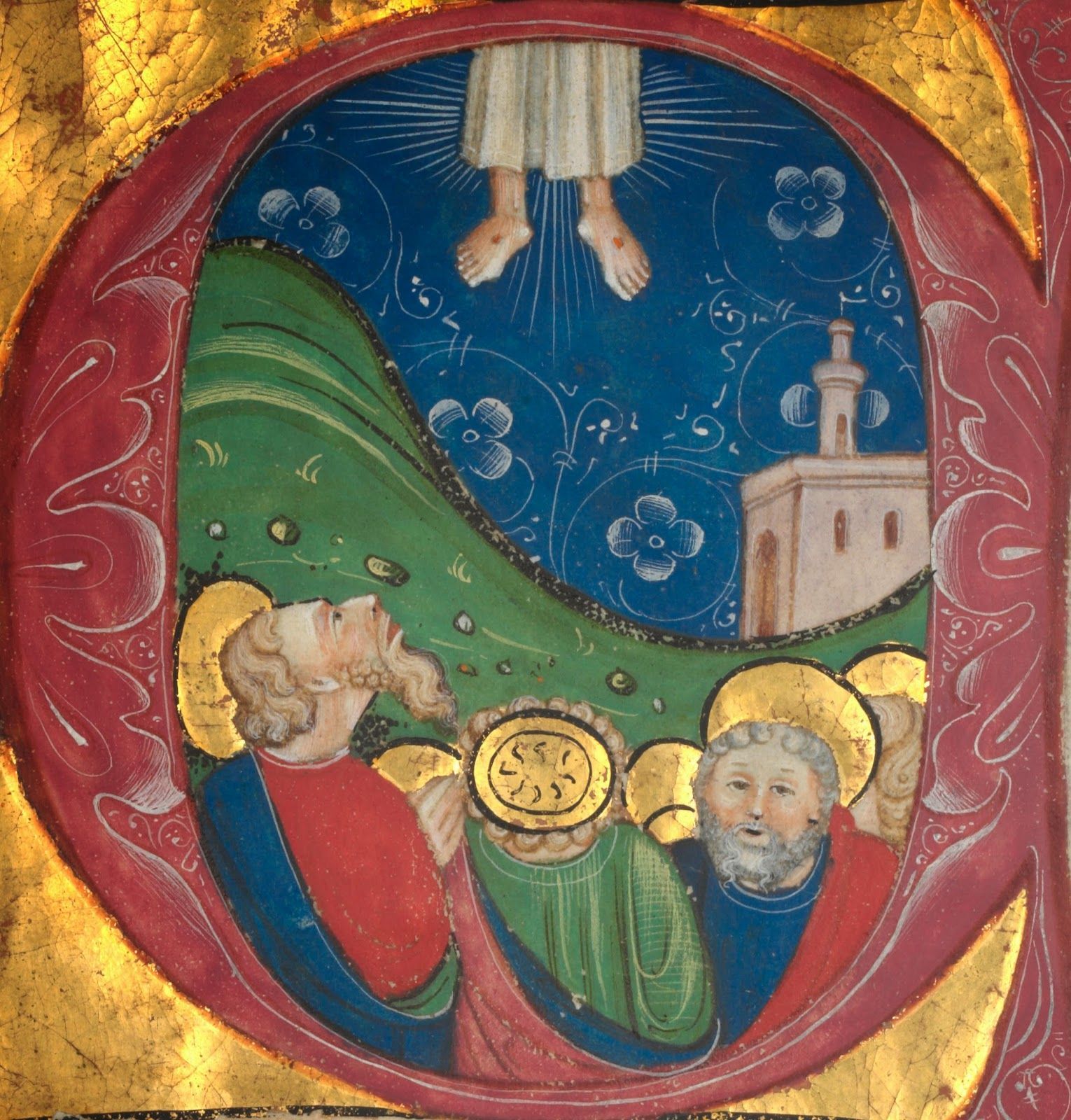Ascension Thursday
A Festival of the Future of the World: Abbot Brendan's Homily
There is a certain image of the Ascension, very popular in the Middle Ages, that can be found in lots of churches, paintings, and manuscripts. In art terms they can be broadly categorized as ‘disappearing feet.’ They can be rather fun to look at, Christ’s bare feet dangling from the top of the frame, below the hem of his garment, the rest of his body already disappeared from sight, quite often behind a cloud. This type of image seems to be a rare Anglo-Saxon innovation and spread to become popular in northern Europe. They are quite fun to see, feet dangling from a roof boss.
They remind us of the Ascension, but do they help us understand what this mystery is all about? Something that Cardinal Ratzinger thought alien to the modern mind. It is no criticism of the artists. How do you paint a profound spiritual mystery like the Ascension, a mystery that touches on the material and the spiritual, earthly and the heavenly, summed up in the words of the Prophet Isaiah: Isaiah 40:5 “all flesh shall be the salvation of God.” (Luke 3:6, c.f. Isaiah 40:5)
But what does that really mean—for Christ, and for us? Pope Benedict sums it up well:
“The Ascension expresses our belief that in Christ human nature, the humanity in which we all share, has entered into the inner life of God in a new and hitherto unheard of way… Heaven is not a place beyond the stars; rather it is something much greater, something that requires far more audacity to assert: heaven means that man now has a place in God.”
That is quite a claim! Our humanity, in all its earthiness and fragility, has entered the very heart of the Trinity. The Ascension tells us that human life—our life—is not destined for oblivion, nor for endless wandering. In Christ, it has found its place, eternally secure in God.
So Karl Rahner, with his characteristic depth, called the Ascension “a festival of the future of the world.” He goes so far as to say: “The flesh is redeemed and glorified, for the Lord has risen forever. We Christians are, therefore, the most sublime of materialists.”
That’s not a celebration of consumerism or comfort, but a proclamation of faith: that the material world, our bodies, our time, our work, even our suffering—all are capable of being redeemed and glorified. Christ has taken them up and not cast them off. We believe not in escape from the world, but in its transfiguration.
Now, if we were writing the Gospel, how would we end it?
You might think the image of Jesus being lifted up, His feet vanishing into the sky, would suggest an ending. A farewell. A departure. And indeed, Luke ends his Gospel on that very note—but he doesn’t stop there. He begins the Acts of the Apostles with the same scene, only this time not as an ending, but as a beginning.
The Ascension marks a turning point. Not the conclusion of Jesus’ story, but the begining of His presence in a new way. It opens the door to Pentecost. It prepares the way for the Church and the pouring out of the Holy Spirit.
We need only note how the apostles responded to the Lord’s Ascension at Bethany.
If this was a farewell, you would think they would be grieving. But there are no handkerchiefs, no tears. Instead, Luke tells us, “While he blessed them…they worshipped him” and they went back to Jerusalem full of joy, continually blessing God.
Why such joy? Because they had come to understand that Jesus was not gone, but glorified. Not absent, but now present in a way even more profound. The Holy Spirit was not coming to replace Christ, but to make Him present in every place and time—in the heart of the Church, in the Word proclaimed, in the Sacraments, in our hearts.
Heaven is now joined to earth. Our humanity is lifted up, not left behind. Christ, the Head, has gone before us, and where the Head has gone, the Body hopes to follow.
So today, with the apostles, we rejoice. “Christ has entered into heaven itself.” (Heb 9:24) With the Church throughout the world, we lift up our eyes—not in nostalgia, not in loss—but in hope. We dare to believe that we, too, have a place in God.
God has gone up with shouts of joy.
Sing praise for God, sing praise! (Psalm 47)











